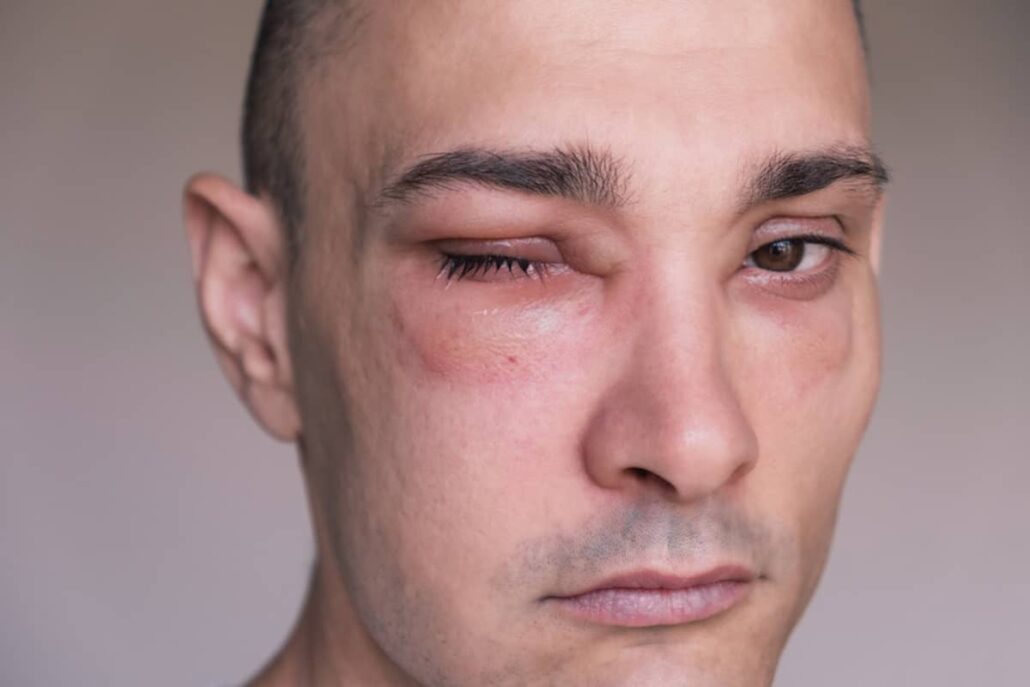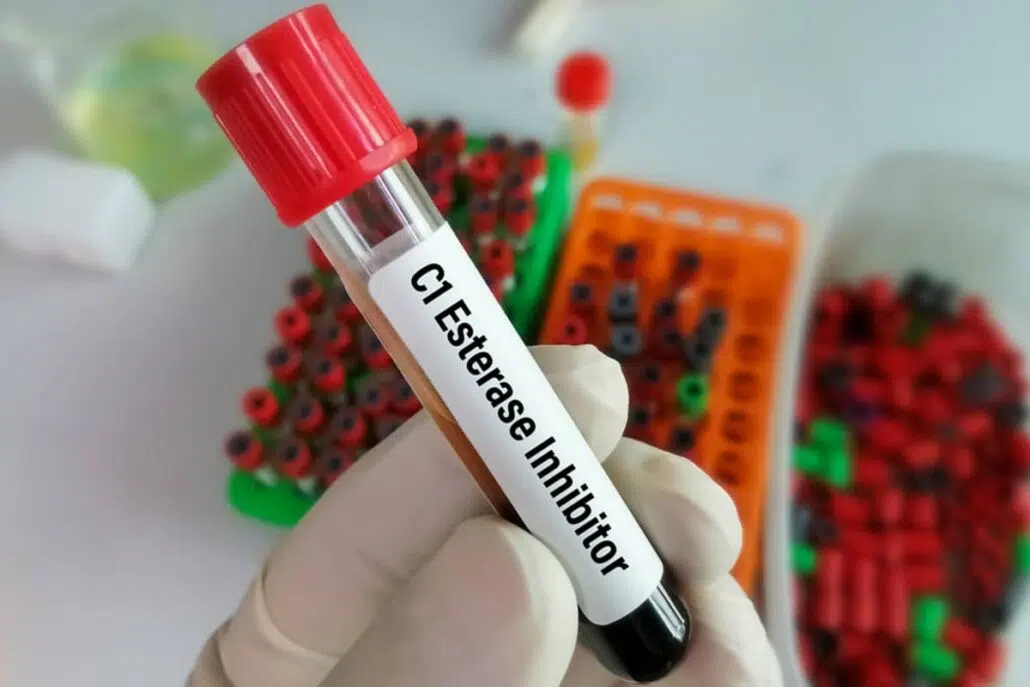Understanding the Role of C1 Inhibitors in Hereditary Angioedema
Hereditary angioedema (HAE), a rare but potentially life-threatening condition, is often associated with a deficiency in a protein known as the C1 inhibitor. The role of the C1 inhibitor is pivotal in managing this genetic disorder due to its significant function in the body’s immune response. On a functional level, this protein acts as a critical check mechanism, helping regulate the immune and inflammatory responses.
When there is a deficiency or malfunction in the C1 inhibitor, it can lead to an overactive immune response which often manifests as HAE. This condition is characterized by episodes of swelling (angioedema), particularly affecting areas such as the face, airways, and the gastrointestinal tract.

Research studies have suggested that patients with angioedema may either have a decrease in the quantity or functionality of the C1 inhibitor at a cellular level. So, not just the presence, but the effectiveness of normal C1 inhibitors in the body is crucial for disease management.
Understanding and enhancing the role of C1 inhibitors could open up new possibilities for the treatment of HAE. Advancements in this field have the potential to significantly improve the quality of life for patients suffering from this condition. These inhibitors, therefore, represent a key area of focus in the ongoing quest for better, more effective therapeutic interventions.
The Biology Behind C1 Inhibitor Deficiency
C1 inhibitors, also known as C1-INH, are a form of proteins that play a key role in moderating the body’s inflammatory response. Specifically, they regulate the activation of the complement system, a critical part of the innate immune response.
When there’s a presence of a normal C1 inhibitor, it helps to control the inflammatory responses that could cause tissue damage during infections or other medical conditions. This function is crucial because an overactive inflammatory response can be as harmful as an underactive one. The balance and regulation provided by the normal C1 inhibitor are hence vital to maintaining the body’s health.
On the other hand, when there’s inhibitor deficiency, it means the body cannot adequately control inflammation. The absence or reduced level of C1-INH can lead to unnecessary or excessive activation of complement and contact systems in the body. This can cause a variety of symptoms and conditions, which is why understanding the C1-Inhibitor Deficiencies is crucial for providing appropriate treatment.
People with such a deficiency may experience recurrent episodes of swelling, particularly in the face, limbs, and gastrointestinal tract. These episodes can be life-threatening if they involve throat attacks. On a molecular level, the deficiency is often caused by a mutation in the C1 INH gene of patients which results in a dysfunctional enzyme. This situation entails a differential diagnosis for precise identification and treatment.
Relationship between C1 Deficiency and Angioedema
C1 inhibitor deficiency functions as a significant trigger of angioedema episodes in patients. Essentially, this deficiency unfolds an adverse course that spirals into angioedema, a condition characterized by rapid swelling under the skin. Can you imagine an intricate cascade in your body, usually striking harmony, suddenly turning against you? That’s how inhibitor deficiency operates. When the C1 inhibitor is not available enough, it directly interferes with two significant systems in your body: the complement system and the bradykinin pathway, both play crucial roles in the fight against infections and inflammation.
Once disturbed, excessive bradykinin, a powerful vasodilator, gets released, causing the blood vessels to broaden and become permeable. Consequently, fluid escapes into the surrounding tissues, triggering angioedema episodes. Moreover, patients who have this deficiency most commonly encounter recurring, painful, swelling attacks in different parts of the body. Remember the angiotensin-converting enzyme? It’s an enzyme that usually breaks down bradykinin, but unfortunately, in this case, it is unable to perform its role effectively due to inhibitor deficiency. This leads to further severity of angioedema attacks in adult patients.
Insights into Hereditary Angioedema Pathology
HAE is a medical condition that results in episodes of swelling. It often affects parts of the body like the face, upper body, and limbs. The main manifestation of this disorder is intermittent episodes of angioedema or severe swelling.
Subjects with this disorder may present an array of symptoms (often mistaken for an allergic reaction) that fluctuate in severity, often with sudden onset. The sudden and severe swelling of the hands, feet, limbs, face, intestinal tract, or airway can lead to critical attacks. These episodes can last for several days if not treated. Another symptom affiliated with angioedema is laryngeal edema. This symptom could be fatal due to the possibility of suffocation.

Diagnosing HAE can be challenging due to the spectrum of symptomatic expressions. Thus, a thorough assessment of symptoms, medical history, and genetic testing is often required to confirm the diagnosis.
Moreover, certain triggers such as emotional stress, trauma, or medical procedures may provoke angioedema attacks. However, managing this disorder is achievable. Regular prophylaxis treatments and lifestyle adaptations can greatly reduce the frequency and severity of angioedema episodes.
People who live with this disorder can live healthy and productive lives when they recognize their symptoms early and have effective management strategies in place. These methodologies provide crucial insights into the pathology of HAE, bringing research and medical communities closer to achieving optimal patient care.
Role of Bradykinin in HAE
HAE is widely understood to be associated with the abnormal production of a small, vasoactive peptide hormone known as bradykinin. This hormone is a significant player in numerous inflammatory processes. Research indicates that an increase in bradykinin levels may lead to angioedema attacks, as it triggers the dilation of blood vessels and the movement of fluids into surrounding tissues, thereby causing edema.
Renowned HAE researchers have established that individuals who have low levels of C1-INH, a protein that regulates the generation of bradykinin, are prone to suffering from bouts of HAE. This implies that a surplus of bradykinin and a deficit of C1-INH could lead to repeated attacks of angioedema, exacerbating conditions like erythema marginatum (a skin rash often preceding an attack).
Understanding this connection has been pivotal in developing treatments that reduce the production of bradykinin or increase the presence of C1-INH, hence offering relief to many people living with this debilitating condition. However, continuous research is necessary to fully comprehend the intricate relationship between bradykinin, HAE, and subsequent attacks.
Understanding the Genetic Aspect of HAE
The role of genetic mutations in causing HAE can’t be underestimated. Patients with HAE have mutations in the SERPING1 gene that carry and produce the C1 esterase inhibitor. Notably, one mutation type, exon deletions, often result in a nonfunctioning or absent protein. Detecting these mutations is essential for the diagnosis and management of HAE, considering the significant implication of understanding the genetic aspect of HAE in its treatment.
Regarding diagnosis, two primary methods are utilized. The first is by conducting a blood test to check the levels of the C1 esterase inhibitor. Low levels of this protein confirm the existence of angioedema. The other method uses genetic testing to identify mutations in the SERPING1 gene. Despite the involvement of genetic mutations, remember that HAE, also known as angioneurotic edema, can be occasionally caused by other non-genetic factors, making comprehensive diagnosis crucial.

Therefore, understanding and banning the mysteries behind genetic mutations help physicians adopt proactive measures to manage and potentially curb the condition’s impact.
Hormonal Influences on HAE Symptoms in Female Patients
Actual hormone levels in female patients could potentially worsen the symptoms of HAE. It has been observed that hormonal changes, specifically in female patients, often aggravate these symptoms. In particular, angioedema incidence in women is higher during periods of hormonal fluctuation, such as pregnancy or menstruation. Consequently, this suggests a direct correlation between these hormone level changes and the exacerbation of HAE symptoms.
In people with HAE, there’s an inadequacy or absence of this protein, causing frequent episodes of swelling and inflammation. Further observation revealed a noticeable pattern of HAE symptoms getting worse with hormonal surges in female patients.
As a preventive treatment, some patients are recommended hormone replacement therapy to stabilize hormone levels. This therapy has been successful in reducing the regularity and severity of HAE flare-ups in some female patients. It must always be recalled, however, that any treatment plan should be tailored to the individual’s needs and response patterns.
Comprehensive Review of HAE Treatments
Currently, there is no cure for this deficiency, but there are several treatment options available. These include prophylactic therapy with attenuated androgens or antifibrinolytic agents, or fluid replacement therapy with plasma-derived or recombinant C1 inhibitors. A newer on-demand therapy involves a synthetic peptide that mimics the function of the C1-INH to neutralize the uncontrolled activation of the inflammatory response.
Notably, acute HAE attacks, characterized by unpredictable abdominal pain or airway swelling, typically call for immediate demand treatment. In these scenarios, healthcare professionals administer a dose of C1-INH concentrate. Clinically proven to reduce the severity and duration of acute attacks, this approach is endorsed by authoritative medical journals such as Annals of Allergy, Asthma & Immunology.
To further counter HAE symptoms, a distinct treatment option focuses on preventive care, employing long-term prophylactic medicines. This strategy aims to control the frequency and severity of attacks, improving patients’ quality of life significantly.
At the center of these preventive methodologies is the use of C1-INH concentrate, which has shown immense efficacy in clinical trials worldwide. The positive outcomes associated with C1-INH concentrate validate its reputation as a reliable weapon in the fight against HAE.
In recent times, continuous advancements in HAE treatment protocols have broadened the spectrum of available options, demonstrating a promising future for managing this debilitating condition. Nevertheless, this overview is far from exhaustive, underscoring the importance of every individual’s unique medical history in determining the most suitable treatment approach.
Managing Life with HAE
Living with angioedema is a daily challenge, necessitating diligent management of medical symptoms. Patients must monitor for symptoms, which often involve the upper airway and can result in discomfort or even dangerous obstruction. Airway management, therefore, becomes key in the condition management process. It is crucial to safeguard against any blockages, particularly in the upper airway, as this can prove potentially life-threatening.
Moreover, individuals need to find appropriate strategies to manage pain, which can often be severe and recurrent. Pain often manifests as abdominal discomfort, which may periodically intensify, but it can also occur elsewhere in the body due to swelling or angioedema. Recurrent angioedema can cause persistent agonizing sensations that require the application of proper pain management protocols.
Another aspect of HAE patients should be cognizant of is the fluctuation and levels of the protein C4. Monitoring these levels is pivotal as it helps predict flare-ups and manage the conditions better. It is the lack of a certain enzyme that leads to these characteristic symptoms of angioedema, and understanding such nuances of the condition can empower patients to lead a more balanced life.
By considering every aspect, from managing airway obstructions to alleviating pain to tracking C4 levels, life with HAE can be managed more efficiently. It requires a focused approach, but with proper support and regular monitoring, living with hereditary angioedema can be managed effectively, allowing a quality life for the patients.
Choosing a qualified professional to tackle the intricate issues related to HAE is critically important. This rare, life-threatening medical condition requires not just extensive knowledge and professional expertise but also sensitivity toward the unique intricacies each patient presents. It is paramount to trust one’s health to an individual that not only understands the pathophysiology of hereditary angioedema but can also effectively guide each patient through their unique course of disease and treatment.
Penn Medicine Becker ENT & Allergy stands out as an authority on issues related to HAE. With several years of dedicated experience in this particular field, their specialists have a deep understanding and proven expertise founded on countless successful treatments provided to patients. Contact Penn Medicine Becker ENT & Allergy today for a consultation.

